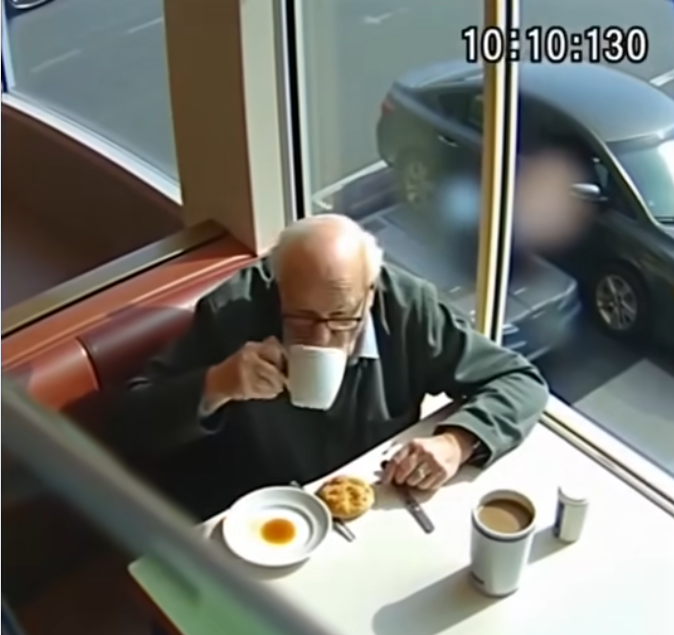For months, I thought the quiet old man who came into Denny’s every Sunday was just a kind-hearted regular, someone who liked to brighten the day of overworked servers. He always claimed the same booth by the window, ordered black coffee and a Grand Slam breakfast, and left exactly one hundred dollars. No note, no comment—just a polite nod and a gentle smile before disappearing into the parking lot, like he belonged somewhere else entirely.
I used to tell my coworkers that he reminded me of a character from an old movie: a man carrying a lifetime of memories but never speaking of them. I never imagined he had any personal connection to me. He was simply a comforting constant in my Sunday routine—a quiet presence, a gesture of kindness, a moment of calm in a hectic job.
Then one evening, my mom came into my room holding an old, slightly faded photograph. She looked uneasy, almost guilty, as she placed it in front of me. My eyes immediately recognized the face: the same man, only younger and with a faint, familiar smile.
“That man… Jess, he’s your grandfather,” she said softly.
The words stopped my world. My grandfather? The same man who had been slipping me $100 every week like clockwork? The man I had politely called “sir,” thinking he was just another regular? I had never even known I had a grandfather—my mother never mentioned him, and I assumed he had passed long before I was born.
She sat beside me, hands fidgeting together. “We had a falling out, a serious one. He disappeared before you were born, and I didn’t know if we’d ever reconnect. I couldn’t contact him.”
The revelation felt cinematic but painfully real. All those Sundays… he had known me. He had silently watched, offering support in the only way he believed he could: one hundred dollars at a time, no recognition, no intrusion.
The following Sunday, I could barely focus. Every time the bell above the door rang, my heart leapt. My hands trembled as I poured coffee for customers, and my stomach twisted. What would I even say? What if he didn’t come? What if, knowing I now knew, he vanished again?
Then he entered.
He seemed smaller somehow, age etched into his every movement—a subtle tremor in his hands, a measured step, eyes heavy with unspoken years. But when he looked at me, there was warmth, recognition, even relief.
I walked straight over to him.
“Are you… my grandfather?” I asked, voice quivering on the last word.
He closed his eyes briefly, steadying himself. When he opened them, tears glimmered. “Yes,” he said quietly.
No dramatic pause. No prepared speech. Just honesty, and in his expression—a mix of guilt, hope, and apprehension—something broke inside me. I leaned in and hugged him. At first, he hesitated, unsure if he had the right, then wrapped his arms around me, carrying decades of emotion in that embrace.
Slowly, he began to speak.
Years ago, he’d fought with my parents. Pride, misunderstandings, stubbornness—he had mismanaged it all. By the time he realized his mistakes, too much time had passed. So he stayed away, watching from a distance, slipping in every Sunday to see me, even if only for a fleeting moment.
The $100? His apology in disguise—a gift he could give without taking anything in return.
I should have felt anger—anger at the secrecy, the lost years, the emotional strain—but I didn’t. I saw a man weighed down by regret, afraid to say the wrong word, yet persistently trying in the only way he knew how.
Soon, our Sundays became real. Genuine conversation replaced polite nods. He told me stories about my mom as a child—tales she’d never shared. Mischief, road trips, the way she laughed with her entire body. I showed him photos of Peanut, my dog, who eventually joined our breakfasts, curling into his lap as if they’d known each other forever.
Eventually, I convinced my mom to join one Sunday. She resisted. Old wounds don’t heal quickly. The first moments were tense, filled with cautious small talk. Slowly, awkwardly, they began to reconnect—talking, disagreeing, talking again—honestly, really.
The $100 tips ceased. He no longer needed to leave them, and I no longer needed to receive them. What replaced them was far more valuable: a connection restored, a piece of family reclaimed, and the understanding that kindness often carries a story far deeper than the gesture itself.
From all this, I learned something essential: people carry entire worlds inside them, hidden behind quiet acts and unfinished words. Sometimes, the smallest gesture—a weekly breakfast, a folded bill—represents an attempt to right past mistakes.
I don’t know how many Sundays we have left together. Life makes no promises. But we’re no longer strangers in a diner. We are family, carefully rebuilding something fragile but real, one Sunday at a time.
And truly? That is worth far more than every $100 bill he ever left behind.
